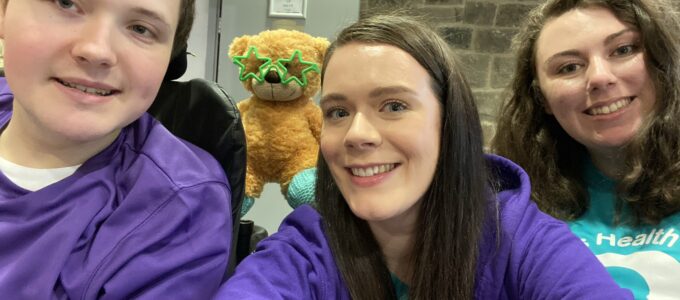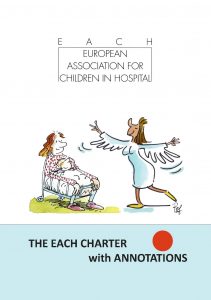
We can all struggle with our mental health from time to time and this is certainly true for children and young people. Feeling anxious, upset, angry or sad is completely normal, but sometimes this can go on for longer than would be expected or it begins to have an impact on the child or young person being able to get on with life, thrive and develop.
We offer a range of services to support the mental health and wellbeing of children and young people in Scotland. These include:
-
SMS:F2F
A self-management skills programme that we deliver face-to-face to support children and young people living with health conditions.
CLICK HERE to find out more -
SMS:CONNECT
An online self-management skills programme that supports children and young people living with health conditions.
CLICK HERE to find out more -
SMS:WHYWEIGHT
SMS:WhyWeight is a six-week healthy weight programme of online group sessions for children and young people aged 9-17 which we deliver in partnership with NHS Forth Valley.
CLICK HERE to find out more -
SMS:HUB
The SMS:HUB is a monthly online group session for children and young people who have taken part in one of our self-management programmes.
CLICK HERE to find out more -
INFORMATION AND SUPPORT
Direct support and guidance to families on health rights and supporting the health and wellbeing of children and young people at times of illness.
CLICK HERE to find out more -
HEALTH AND WELLBEING SUPPORT
We can offer 1:1 sessions for children and young people in primary or secondary school settings. Sessions can focus on managing anxieties around health issues, and practising skills and coping strategies to promote health and wellbeing. We can also support families on a specific health need such as preparing for an upcoming hospital admission or procedure.
CLICK HERE to find out more -
TRAINING
We can deliver training sessions and presentations to Early Years and Additional Support Needs staff on Health-Related Play and Dental Health.
PROFESSIONAL LEARNING RESOURCE FOR SCHOOLS
We are very proud to have been part of the team who developed the new online Professional Learning Resource for school staff on behalf of the Scottish Government. This resource reflects the Government’s commitment in their 2020 Programme for Government to develop and strengthen mental health resources available to schools.
Children’s Health Scotland were one of three partners, along with the Mental Health Foundation Scotland and Digital Bricks, who carried out an extensive consultation phase and developed content for this resource. The resource takes a whole school approach centred around prevention and early intervention to promote positive mental health and wellbeing for everyone in the school community. The resource includes topics very close to our heart at Children’s Health Scotland – including Understanding the brain, Understanding trauma and adversity, Supporting children and young people with health conditions, and Talking to children and young people about their mental health and wellbeing”. The resource was designed for ALL school staff at all levels in primary, secondary and special school settings. Although it is aimed primarily at school staff, it is open access and can be used by anyone who wants to learn about mental health and wellbeing and how to support children and young people.
MENTAL HEALTH WEBSITES
If you are struggling with your mental health and wellbeing, then talking to those who care for you is a good start and is often all that is needed. Looking at what apps and websites are available together can also help work out what will be most useful. The websites and apps listed below are designed to support children and young people with mild mental health problems, but they can also be useful in addition to being seen in a specialist service.
The following descriptions of the websites and apps are based on the information provided by the organisations that have developed the individual digital resources
Aye Mind is on a mission to improve the mental health and wellbeing of young people – by making better use of the internet, social media and mobile technologies. Aye Mind has worked with young people aged 13 to 21 to create and share a wide range of resources and is also making a digital toolkit for all who work with young people too, to boost their ability to promote youth wellbeing.
HandsOn provides help and practical advice for supporting children and young people’s mental health and emotional wellbeing. Although this website was designed for parents, carers and people who work with children and young people in Fife, its content is relevant to everyone, wherever they live.
MindEd for Families is designed for a parent or carer who is concerned about the mental health of their child or teenager. It can provide tips on parenting and has advice and information from trusted experts that will help the understanding of what problems occur, what can be done to best support the family, and how parents or carers can take care of themselves. MindEd for Families is written by a team of specialists and parents, working together.
Shout is a 24/7 UK crisis text service available for times when people feel they need immediate support. By texting ‘SHOUT’ to ‘85258’ a Texter will be put in touch with a trained Crisis Volunteer (CV) who will chat to them using trained techniques via text. The service is designed to help individuals to think more clearly and to take their next steps to feeling better. Shout was publicly launched in May 2019, after a year long pilot phase. It is based on the successful US model Crisis Text Line. Shout is part of Mental Health innovations (MHI), which was founded in November 2017. MHI was set up following the success of The Royal Foundation’s ‘Heads Together’ campaign, which identified how utilising digital platforms and tools has huge potential to offer support services to individuals struggling with their mental health.
Mental Health APPs
The urge to self-harm has been likened to a wave which feels the most powerful at the start. The Calm Harm app helps the child or young person ride the wave using a selection of activities: Comfort, Distract, Express Yourself, Release, Random and Breathe. ‘Riding the wave’ with these activities helps the urge to self-harm to fade.
In short, Calm Harm provides tasks to help resist or manage the urge to self-harm. It can be made private by setting a password and the app can be personalised and progress tracked.
Calm Harm is an award-winning app developed by the teenage mental health charity stem4 using the basic principles of an evidence-based therapy called Dialectical Behavioural Therapy (DBT).
Helping prepare for going into hospital
The HospiChill app will not only help prepare in the weeks before admission to hospital but also help the child or young person feel more in control when in hospital by teaching them how to relax and stay calm. It has loads of helpful exercises that can be watched and listened so as to keep calm. And HospiChill can be used on the go whenever worried or stressed.
MindShift CBT uses proven strategies based on Cognitive Behavioural Therapy (CBT) to help young people learn to relax and be mindful, develop more effective ways of thinking and use active steps to take charge of their anxiety. The interactive cognitive-based tools are designed to provide behavioural strategies to make lasting positive change and reorient thinking – tackling worry, panic, perfectionism, social anxiety and phobias.
Safespot is designed to help children and young people through tough spots. It provides a personalised coping plan, useful strategies and tools to help, and directions to local resources that can help.
SafeSpot has 3 aspects: The Quirky and Cool SafeSpot App, SafeSpot website, SafeSpot Curriculum. Together these aspects aim to equip young people with all the information, advice and access to services that they need to manage their own mental health and deal with any challenges that life may throw at them.
Further information – mainly for parents and carers
If you, a parent or carer, are worried about a child or young person’s mental health and think they need something more than these APPs and Websites, you can ask about what specialist services are in your area. It might be helpful to talk to someone at their school in the first instance to find out how they are getting on there and if there are any helpful support services in the school, or there may be other options in your community where children and young people can be offered counselling or group work. This can be found by entering your postcode into the ALISS website; http://www.aliss.org/ which has been set up in Scotland to help you find help and support close to you when you need it most.
If the mental health problems are severe and are having a real impact on their day to day life you can ask for a referral to Child and Adolescent Mental Health Services (CAMHS) from a health professional, teacher, school nurse, social worker or GP. It may take some time to be seen by CAMHS so in the meantime it’s important to continue to support the child or young person with what you’ve found helpful online or in your local community.
